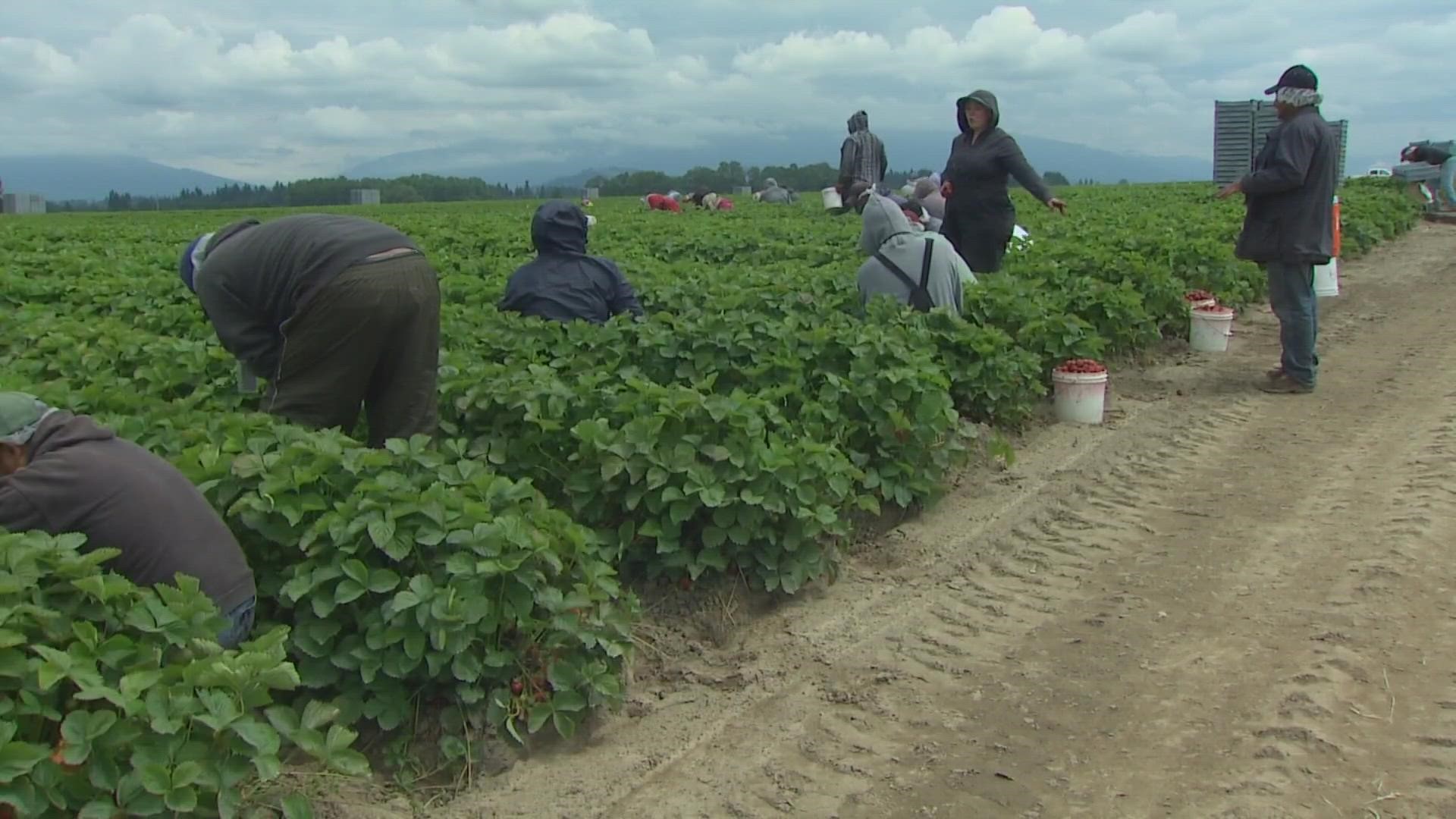OLYMPIA, Wash. — Washington state lawmakers heard public testimony Thursday over a bill that would allow employers to choose up to 12 weeks each year when farm workers could work up to 50 hours without getting paid overtime wages.
The proposed legislation comes weeks after SB 5172, passed in 2021, began to phase in. SB 5172 made farmworkers, who have historically been excluded from overtime pay regulations, eligible for overtime pay. Beginning in January 2022 farm workers started collecting overtime for any hours worked past 55 in a week. That's down to 48 hours this year and drops to 40 hours next year.
Around 2,000 people joined the Senate Labor & Commerce Committee public hearing virtually and in person Thursday morning to voice their support or opposition to Senate Bill 5476.
SB 5476, sponsored by Sen. Curtis Young, R-Yakima, and others, would allow agricultural employers to designate 12 weeks a year as special circumstance weeks during which they wouldn’t have to pay workers overtime until they worked more than 50 hours in a workweek. In the proposed legislation, the employer would have to estimate the selected 12 weeks at least 30 days in advance.
“What we're asking for here is at the low end of what you see in all of these other states, I think it's a fair and equitable thing to do, not only for the farmer but also for the worker as well,” said Young.
Farmers and organizations in support of the bill argued that as Washington state law stands now, it puts a strain on their businesses because they would have to hire more workers because they can’t afford to pay overtime while capping current employees’ hours at 40 hours a week.
“When I can't absorb those large cost increases my only option is to avoid incurring them, meaning unfortunately, cutting my employees back to 40 hours a week or hiring more employees. And that's painful because it hurts the workers and it hurts me,” testified Mark Hambelton, apple grower and Washington State Tree Fruit Association chair.
Those who oppose the bill, including farmworkers, Washington State Labor Council, and United Farm Workers, testified Thursday that SB 5476 goes back on the promise lawmakers made to provide equitable compensation to farmworkers, specifically impacting immigrants.
“Overtime pay is a fundamental right that has protected most workers since the New Deal. (In) 2021, we all carefully negotiated the terms of these rights for workers,” said Sybill Hyppolite with the Washington State Labor Council. “Employers were given a slow three-year phase-in to full overtime rights for their employees. Workers were given a date certain for the realization of their full rights. This bill backs out of that agreement, a compromise that was favorable to employers.”
Farmworker Alfredo Juarez, who lives off his summertime wages in winter and picks up work in packing plants, believes the 12 weeks per year would invariably come during summer and fall harvests, meaning he would be working more and making less.
"It's not fair," Juarez said. "It's really not fair at all."
There's also a social justice component at play. The exemption of farmworkers for overtime came out of the Deep South in the 1930s, and some say it's a remnant of racism that should be eradicated.
“It's hard to come by a more straightforward example of systemic racism and we must not be press forward with this,” argued Andrea Schmitt, an attorney with Columbia Legal Services.
Schmitt was on the legal team behind Martinez-Cuevas v. DeRuyter Brothers Dairy, Inc., where the Washington State Supreme Court ruled that dairy workers’ exclusion from overtime pay was unconstitutional.
According to the U.S. Department of Labor, 70% of farmers in the country are foreign-born.
“So, this bill, whether the intention or not, is to be racist or to uphold those systemic racist problems, you know, it's just definitely unfair. It's very unfair for these workers. Every other industry has overtime pay. These folks should have overtime pay,” said Giovanni Severino with Progreso: Latino Progress, a legislative advocacy group for Latinos and people of color in Washington state.
SB 5476 will continue to make its way through the committee process before it is forwarded to the state Senate for a full vote.

